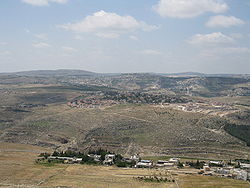Tekoa (Israeli settlement)
Tekoa
תְּקוֹעַ | |
|---|---|
 View of Tekoa from Herodion | |
| Coordinates: 31°39′11″N 35°13′45″E / 31.65306°N 35.22917°E | |
| District | Judea and Samaria Area |
| Council | Gush Etzion |
| Region | West Bank |
| Founded | 1975, 1977 |
| Founded by | Nahal |
| Population (2022)[1] | 4,326 |
Tekoa (Hebrew: תְּקוֹעַ) is an Israeli settlement organized as a community settlement in the West Bank, located 20 km northeast of Hebron, 16 km south of Jerusalem and in the immediate vicinity of the Palestinian village of Tuqu'. It falls under the jurisdiction of Gush Etzion Regional Council.[2] In 2022 it had a population of 4,326.
The international community considers Israeli settlements in the West Bank illegal under international law, but the Israeli government disputes this.[3]
History
Founding

Tekoa was established in 1975 as a Nahal outpost in the vicinity of the Palestinian village of Tuqu'. In 1977 it was handed over to civilian residents.[4] It is named after the hometown of the Biblical prophet Amos, which is usually identified with Khirbet Tuqu' (located 3km away adjacent to the Palestinian village of Tuqu').[5]
Tekoa is built on 1071 dunam of land which, according to ARIJ, Israel confiscated from the Palestinian citizens of Tuqu'.[6]
The town is located 5 miles south of Bethlehem at the foot of Herodion ("Herod's Palace").
Archaeology and landmarks
Ancient caves and caves that were dug in the karst chalk stone of the Nachal Tekoa or Wadi Khureitun, named after Chariton the Confessor, by monks from the Lavras of Saint Chariton and his successor Euthymius the Great, are right behind Tekoa.
Geography
Tekoa is located 2,177 feet (664 meters) above sea level on a ridge surrounded on three sides by a deep canyon, Nahal Tekoa, that runs east to the Dead Sea.[7] It has a mean annual rainfall of 410mm, an average annual temperature of 17 degree Celsius, and an average annual humidity of c. 60 percent.[8]
Demographics
Tekoa is populated by a mix of religious Zionists and secular Israelis. Many new immigrants from the former Soviet Union also live in Tekoa. In 2015, the population numbered 3,671.
The former chief rabbi of Tekoa, Menachem Froman, a founding member of Gush Emunim,[9] maintained close ties with PLO and Hamas leaders.[10] Rabbi Froman taught at the local hesder yeshiva headed by Rabbi Adin Steinsaltz.[11] Froman died in 2013.
Economy
In 1989, the Tekoa Agro-Technology Farm established in 1986 was named Enterprise of the Year by the Israeli Journal of Agricultural Settlements.[12]
Arab-Israeli conflict
In May 2001, two Israeli boys from Tekoa, Koby Mandell and Yosef Ishran, were killed, by unknown person(s) who were never apprehended.[13][14]
In September 2001 an Israeli was shot and killed in Tekoa when militants opened fire on her family's car.[15]
In February 2002, two Israelis were killed in a shooting attack near Tekoa. The Al-Aqsa Martyrs' Brigades claimed responsibility for the attack.[16][17]
Status under international law
Like all Israeli settlements in the Israeli-occupied territories, Tekoa is considered illegal under international law, though Israeli disputes this. The international community considers Israeli settlements to violate the Fourth Geneva Convention's prohibition on the transfer of an occupying power's civilian population into occupied territory. Israel disputes that the Fourth Geneva Convention applies to the Palestinian territories as they had not been legally held by a sovereign prior to Israel taking control of them.[3] This view has been rejected by the International Court of Justice and the International Committee of the Red Cross.[18]
Notable residents
- Rabbi Menachem Froman, rabbi and peace activist
- Dr. Stephen Wiesner, physicist whose proposals launched the field of quantum information theory, including quantum money (which led to quantum key distribution), quantum multiplexing (the earliest example of oblivious transfer) and superdense coding
- Marc Zell, lawyer.[19]
References
- ^ "Regional Statistics". Israel Central Bureau of Statistics. Retrieved 21 March 2024.
- ^ "Gush Etzion". Archived from the original on 2011-09-05. Retrieved 2011-08-24.
- ^ a b "The Geneva Convention". BBC News. 10 December 2009. Retrieved 27 September 2011.
- ^ Nahal settlements [Hebrew]
- ^ Claudine Dauphin (1998). La Palestine byzantine, Peuplement et Populations, Vol. III : Catalogue. BAR International Series 726. Oxford: Archeopress. p. 928.
- ^ Tuqu’ Town Profile, pp. 17-18, ARIJ
- ^ Tekoa geography Archived 2009-01-07 at the Wayback Machine
- ^ [1] "Tuqu' Town Profile", Applied Research Institute-Jerusalem. 2008. Retrieved on 2012-03-13.
- ^ KERSHNER, ISABEL (December 5, 2008). "From an Israeli Settlement, a Rabbi's Unorthodox Plan for Peace". The New York Times. No. in print on December 6, 2008, on page A8 of the New York edition. Retrieved 13 August 2014.
- ^ Video of Rabbi Menachem Froman signing the Froman-Amayreh Accord
- ^ "Welcome to Tekoa". Archived from the original on 2010-12-29. Retrieved 2010-12-25.
- ^ Tekoa Agro-Technology Ltd.
- ^ "Ya'acov (Kobi) Mandell, Yosef (Yossi) Ish-Ran, May 9, 2001 // In Memory of the Victims of Palestinian Violence and Terrorism in Israel". mfa.gov.il. Retrieved 23 September 2015.
- ^ "The Deadly Reality of Palestinian Rock Throwing". Israel Defense Forces. 2014-02-24. Retrieved 20 September 2015.
- ^ Sarit Amrani
- ^ Avraham Fish
- ^ Aharon Gorov
- ^ Legal Consequences of the Construction of a Wall in the Occupied Palestinian Territory Archived 2010-07-06 at the Wayback Machine International Court of Justice, 9 July 2004. pp. 44-45
- ^ Tobin, Andrew (August 5, 2016). "Donald Trump supporters launch push for American 'swing state' votes in Israel". Jewish Telegraphic Agency. Retrieved August 5, 2016.
Zell, a U.S.-born attorney who lives in the West Bank settlement Tekoa, was a late convert to the Trump cause, and he said most of the Republican Overseas Israel board members were, too.

